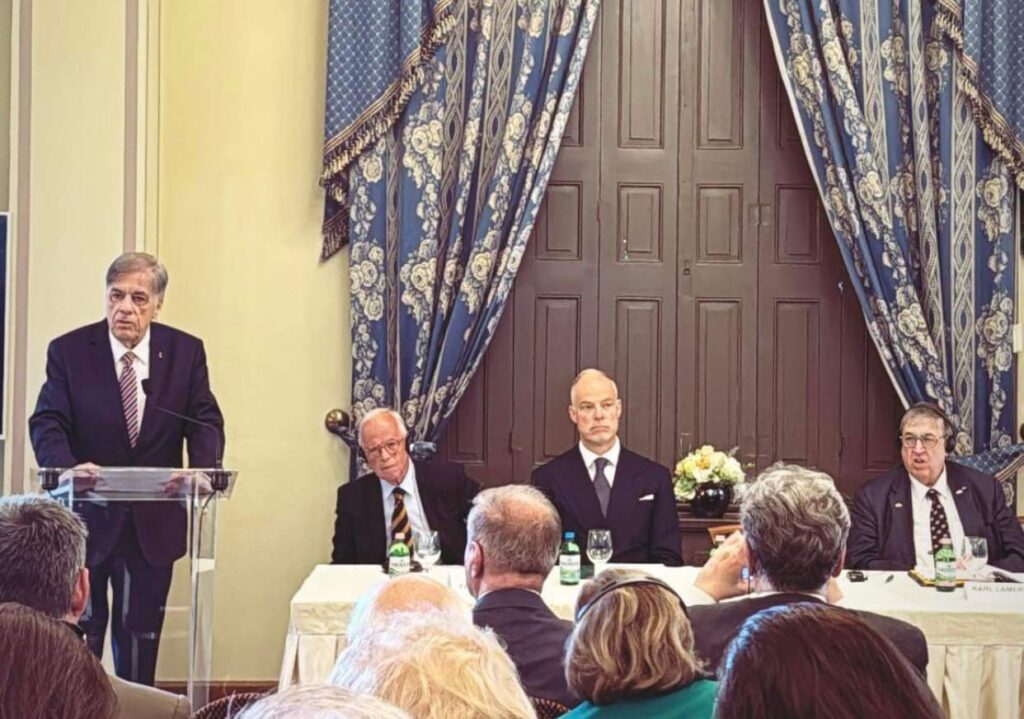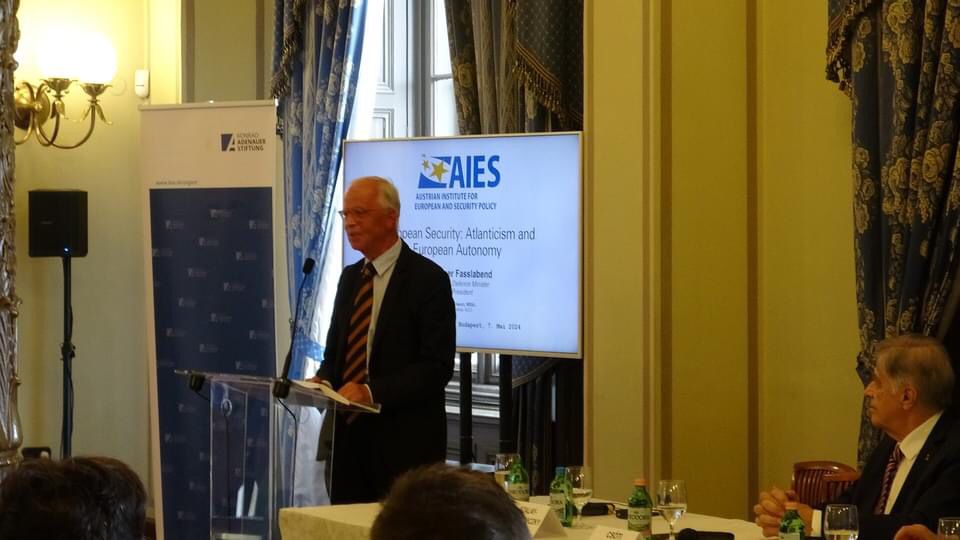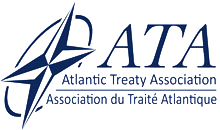“International Conference on Atlanticism and European Defense Identity Organized by the Hungarian Atlantic Council, member of ATA”
The Atlantic Treaty Association’s member from Hungary, The Hungarian Atlantic Council (HAC), held a major international conference on 7 May 2024 in the Headquarters of the Hungarian Academy of Sciences. At the event, which generated great interest, renowned Hungarian and foreign speakers shared their views on the future of Atlanticism. They concentrated on two major issues: the possibilities of European defense identity and the recent crisis of values and conflicts of interest in the transatlantic area. HAC is a non-profit NGO based on a broad social base and standing above parties. The opinions expressed reflected diversity, but they agreed on one thing: there is no alternative to transatlantic cooperation, NATO and the European Union for Central Europe, including Hungary.

Among the speakers at the conference, Dr. Werner Fasslabend, Vice President of the Atlantic Treaty Association (ATA), President of the Austrian Institute for European and Security Policy (AIES), and former Minister of Defence of Austria, represented the President of ATA, Mr. Theodossios Georgiou as a keynote speaker. He was on the same panel as Ambassador Kristóf Szalay-Bobrovniczky, Minister of Defence, and Dr. Karl Lamers, former President of the NATO Parliamentary Assembly.
Dr. Fasslabend’s speech at the international conference in Budapest, organized by the Hungarian Atlantic Council, focused on European security dynamics. He discussed the balance between Atlanticism and European autonomy, highlighting key themes such as Europe’s geostrategic environment, the Baltic Sea’s significance for NATO, Poland’s emerging role as a security center, and proposals for a new approach to European security. He also addressed the importance of the Weimar Triangle, US Counter Rim Strategy, perspectives of Atlantic-Pacific cooperation, and the evolving dynamics within the BRICS group. Dr. Fasslabend emphasized the need for continued dialogue and cooperation among European nations, NATO allies, and global partners to enhance European security and stability.

On this occasion the Presidency of HAC issued a statement:
We are living in difficult times. The transatlantic area is threatened by an unprecedented threat of war in our immediate vicinity. Europe and North America are suffering from serious internal crises and, in addition, problems in more remote areas.
Recognizing all this, in the spring of 2023 the Hungarian Atlantic Council renewed and strengthened its leadership and decided to promote the idea of Atlanticism in the Hungarian society as a non-profit NGO based on a broad social base. We are convinced that there is no alternative to transatlantic cooperation for Central Europe, including Hungary. This applies to both NATO and the European Union. At the same time, this does not preclude cooperation in economic, cultural and environmental matters with other parts of the world. However, for this to work smoothly, strong and meaningful transatlantic cooperation is needed. We trust that common sense will prevail in our region as soon as
possible, that we will eliminate the crisis of values and that we will reconcile our national interests on the basis of mutual compromises.
It is in this spirit that we have organized today’s international conference on topical issues of Atlantism. We want to clarify positions and problems. With this important event, we are launching our multi-year work in the Carpathian Basin, with which we would like to promote the undisturbed prosperity of all nations of the transatlantic region with our own means.
NATO is 75 years old and Hungary has been a a member of the North Atlantic Alliance for 25 years. NATO is the most successful military-political alliance in modern history, serving the security of the peoples of Europe throughout its existence. It is no coincidence that Hungary was the first to make joining NATO part of its official policy after the regime change in 1990 and to take a leading role in dismantling the Warsaw Pact, the organisation dividing the continent. There have been years when we have neglected our obligations as allies. Unfortunately, almost all NATO members did the same during this period, and NATO faced serious difficulties as a result. Only Russia’s aggression against Ukraine opened Europe’s eyes to how right Jozsef Antall was, who warned back in the early 90s that the Russian threat had not gone away.
Today, new dangers are emerging. The Hungarian Atantic Council recognised them and undertook the difficult task of initiating a dialogue on them within the framework of this conference as well. Our organisation is aware that, in addition to serious external threats, there are also threats from within, without which Europe and NATO will face the risk of failure.
The first is the crisis of values that threatens Europe (and the whole world). We talk a lot about Euro-Atlantic values and put our faith in them, but we rarely explain what those values are. However, we should not ignore these phenomena: in addition to old dangers, such as anti-Semitism, new ones are emerging, such as the WOKE movement, which question the fundamental values of our societies. We can only counter them if we believe in our Euro-Atlantic values, based on Judeo-Christian traditions, on which NATO has been built since 1949 – acknowledging, of course, and integrating newly recognized ones, such as those of protection of national minorities.
At the same time, we must also see that the world is becoming more complex and threats are emerging that could force America to concentrate on regions other than Europe. This does not mean that Europe would be abandoned, but it does mean that obligations will arise elsewhere that will to a large extent inevitably distract America from Europe, placing far greater burdens on Europe than before. This is reflected in the commitment agreed in NATO at the initiative of the US that Member States should spend at least 2% of GDP on defence. That is why it is timely and important for the MAT to address the need to create European defence autonomy at this conference.
And last but not least, it’s important to review where Hungary stands in providing your own security. We welcome the fact that there has been a major paradigm shift in recent years. The country is once again taking its own defence seriously, taking steps to strengthen national defence, above all to modernise the defence forces and, at the same time, to create its own defence industry.
The conference is only one, though undoubtedly the most spectacular manifestation of our aspirations. In addition, we consider it of paramount importance that last year the Presidency of the Hungarian Atlantic Council established the Antall József Prize, which is awarded every year to a domestic or foreign personality or institution who has significantly contributed to the achievement of the objectives of our organization. The prize for foreigners was presented to Jens Stoltenberg in Brussels on 12 January this year. The NATO Secretary General thanked him for the recognition in a video message.
We will continue our work in the future. We are empowered that the vast majority of Hungarian society accepts and supports these goals. Please, watch the introductory video of the Hugarian Atlantic Council at the following link
Budapest, 7 May 2024.
Presidency of the Hungarian Atlantic Council
